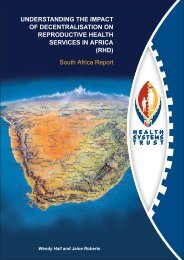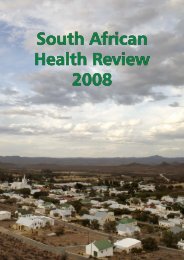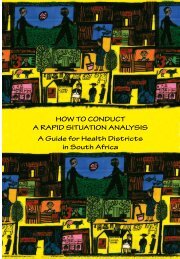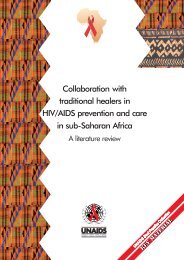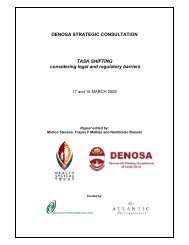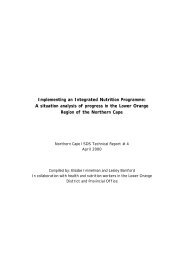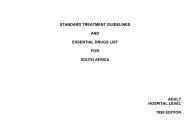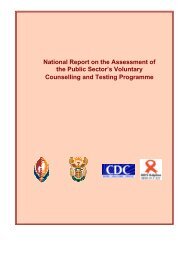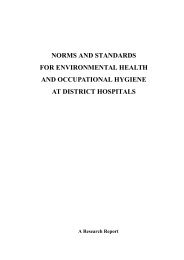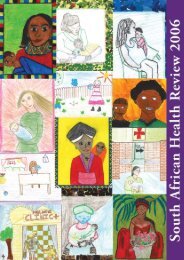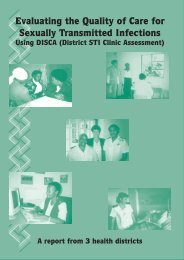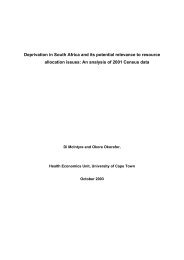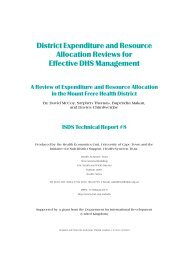SAHR 2007 - Health Systems Trust
SAHR 2007 - Health Systems Trust
SAHR 2007 - Health Systems Trust
You also want an ePaper? Increase the reach of your titles
YUMPU automatically turns print PDFs into web optimized ePapers that Google loves.
which makes it difficult to monitor and to track patients’<br />
progress.<br />
TB co-infection, including extreme drug resistant TB (XDR-<br />
TB), is also reported by AfA to be a growing problem. An<br />
increasing challenge is that DMPs do not offer integrated<br />
programmes traversing the areas of TB, STIs and HIV and<br />
AIDS, and therefore the overall health care needs of individuals<br />
are not managed holistically.<br />
Sexually Transmitted Infections<br />
The public sector has adopted the syndromic management<br />
approach advocated by the World <strong>Health</strong> Organization<br />
(WHO) for the management of STIs. Despite this sound<br />
approach to STI management and the fact that primary<br />
health care is free in the public sector, many clients who<br />
would ordinarily use public sector services consult general<br />
practitioners (GPs) for STI management. Schneider et al. estimated<br />
that half or more of STI episodes in the South African<br />
health sector are treated in the private sector. 6<br />
Palmer et al. noted that the high use of private health services<br />
is partly due to the inaccessibility of public health services,<br />
but in urban areas this might be because of perceptions of<br />
greater privacy, speed of services and quality of diagnosis,<br />
prescribing and counselling. 7 Chabikuli et al. also noted<br />
that GPs are widely available across the country and their<br />
surgeries are often open after hours when public facilities<br />
are closed. Compared to the public sector, communities also<br />
perceive GPs to be less judgemental towards people with<br />
stigmatising conditions such as STIs. When they suspect they<br />
have a STI, poor people prefer to pay for a consultation with<br />
a private GP where anonymity, confidentiality and dignity<br />
are more likely, than to receive free services in the public<br />
sector. 8<br />
Despite increasing perceptions of better quality care, the<br />
reality is that the quality of STI management in the private<br />
sector is highly variable.<br />
Research on the review of prescriptions, found that GPs<br />
knowledge of recent developments in STI management was<br />
poor, with 58.5% who had not heard of syndromic management<br />
and only 32.3% who claimed to apply the syndromic<br />
approach in managing STI patients. Less than half of the GPs<br />
(43.1%) mentioned information, education, counselling or<br />
promotion of condom use as means of supporting patients<br />
to adopt sexual behaviour that reduces the risks of re-infection<br />
and transmission. 9<br />
GPs who qualified in the era of modern syndromic management<br />
of STIs (i.e. after 1993) were 3.5 times more likely to<br />
prescribe the correct treatment than those who qualified<br />
prior to 1993. The generational differences in the quality of<br />
treatment offered suggested that undergraduate education<br />
effectively sets patterns for future practice. Alternatively,<br />
younger GPs may have less fixed repertoires of prescribing,<br />
making them more receptive to new knowledge received<br />
through continued medical education than older GPs. 10<br />
A client’s insurance status also influenced the quality of care.<br />
It was found that there was selective implementation of new<br />
knowledge in favour of medical scheme clients. More than<br />
half of the STI clients (53.4%) were cash paying and these<br />
clients received inferior prescriptions and care. STI clients<br />
with a medical scheme were 2.64 times more likely to receive<br />
effective treatment than cash clients. 10 Some 50.8% of GPs<br />
reported that they prescribed different drug combinations<br />
for insured and uninsured patients for at least one of the<br />
syndromes. 10<br />
The reason for this appears to be that for insured medical<br />
scheme clients, the costs of drugs are recouped from the<br />
medical scheme, whereas cash paying patients pay an all<br />
inclusive fee (for both the consultation and drugs). As a result<br />
there is a financial incentive for GPs to minimise costs by<br />
prescribing cheaper drugs and not adhering to syndromic<br />
management drug protocols.<br />
The research by Chabikuli et al. suggests that the economic<br />
status of the patient and GP’s perceptions of patients’ ability<br />
to pay has a bearing on the reported care provided to<br />
insured and uninsured patients, in line with the incentives of<br />
the payment mechanism. 9 This suggests that GPs prescribing<br />
behaviour could be improved with financial incentives<br />
through targeted subsidies, such as the provision of STI drugs<br />
for cash clients. 10<br />
Clearly, this body of research points to significant limitations<br />
in the extent to which STI syndromic management has been<br />
implemented in the private sector. STI management does<br />
not appear to be a priority for GPs and this may be undermining<br />
national efforts to control STIs especially among the<br />
poor. This problem further underscores the importance of the<br />
NSP requirement for private sector providers and medical<br />
schemes to partner as lead agencies to “increase access to<br />
quality STI service in the public and private sector offered<br />
by adequately trained staff utilising the updated syndromic<br />
management guidelines”. 1<br />
206



